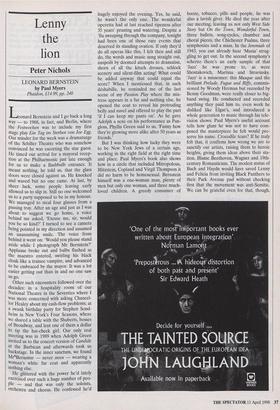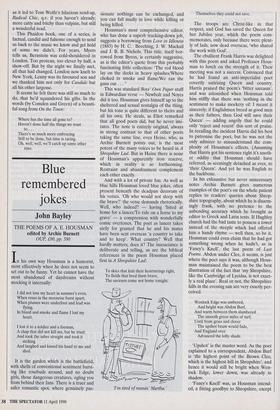Lenny the lion
Peter Nichols
LEONARD BERNSTEIN by Paul Myers Phaidon, £14.99, pp. 240 Leonard Bernstein and I go back a long way — to 1968, in fact, and Berlin, where the Festwochen was to include my first stage play EM Tag im Sterben von Joe Egg. Our minder for the week was a dramaturge of the Schiller Theatre who was somehow convinced he was escorting the star guest. He timed our arrival for a mayoral recep- tion at the Philharmonic just late enough for us to make a flashbulb entrance. It meant nothing, he told us, that the glass doors were closed against us. He knocked and waved but no one came. At last, by sheer luck, some people leaving early allowed us to slip in. Still no one welcomed us to a party supposed to be in my honour. We managed to steal four glasses from a passing tray. After an age and just as I was about to suggest we go home, a voice behind me asked, 'Excuse me, sir, would You be so kind?' I turned to see a camera being pointed in my direction and assumed an unassuming smile. The voice from behind it went on: 'Would you please stand aside while I photograph Mr Bernstein?' Applause broke out and bulbs flashed as the maestro entered, swirling his black Cloak like a trainee vampire, and advanced to be embraced by the mayor. It was a lot easier getting out than in and no one saw us go.
Other such encounters followed over the decades: in a hospitality room of our National Theatre in the Seventies where I was more concerned with asking Chancel- lor Healey about my cash-flow problems; at a swank birthday party for Stephen Sond- heim in New York's Four Seasons, where we shared a table with the Shuberts, bosses of Broadway, and lent one of them a dollar to tip the hat-check girl. Our only real Meeting was in 1989 when Adolph Green invited us to the concert version of Candide at the Barbican and afterwards took us backstage. In the inner sanctum, we found M1413emsrine — never steen — wearing a woman's white fur coat and apparently nothing else. He glittered with the power he'd lately exercised over such a huge number of peo- ple — and that was only the soloists, orchestra and chorus. He confessed he'd hugely enjoyed the evening. Yes, he said, he wasn't the only one. The wonderful operetta had at last reached ripeness after 35 years' pruning and watering. Despite a 'flu sweeping through the company, tonight had been one of those rare events that deserved its standing ovation. If only they'd do all operas like this, I felt then and still do, the words and music sung straight out, unspoilt by doomed attempts to dramatise, shorn of all the kitsch dresses, schlock scenery and silent-film acting! What could be added anyway that could equal the score? When I mentioned that, in such deshabille, he reminded me of the last scene of my Passion Play where the mis- tress appears in a fur and nothing else, he opened the coat to reveal his protruding belly and navel and offered to play the part `if I can keep my pants on'. As he gave Adolph a note on his performance as Pan- gloss, Phyllis Green said to us, 'Funny how they're growing more alike after 50 years as friends.'
But I was thinking how lucky they were to be New York Jews of a certain age, working in the right field at the right time and place. Paul Myers's book also shows how in a circle that included Mitropolous, Blitzstein, Copland and Virgil Thompson it did no harm to be homosexual. Bernstein himself was a one-woman man, plenty of men but only one woman, and three much- loved children. A greedy consumer of booze, tobacco, pills and people, he was also a lavish giver. He died the year after our meeting, leaving us not only West Side Story but On the Town, Wonderful Town, three ballets, song-cycles, chamber and choral pieces, the Chichester Psalms, three symphonies and a mass. In the Jeremiah of 1943, you can already hear 'Maria' strug- gling to get out. In the second symphony's scherzo there's an early sample of that `Jazz' he was prone to, as were Shostakovich, Martinu and Stravinsky. `Jazz' is a misnomer: this Masque and the brilliant Prelude, Fugue and Riffs, commis- sioned by Woody Herman but recorded by Benny Goodman, were really closer to big- band swing. He conducted and recorded anything they paid him to, even work he disliked like Elgar's, and introduced a whole generation to music through his tele- vision shows. Paul Myers's useful account tells how glum he was not to have com- posed the masterpiece he felt would pre- serve his name. Crocodile tears? If he truly felt that, it confirms how wrong we are to sanctify our artists, raising them to heroic heights, giving them ideas above their sta- tion. Blame Beethoven, Wagner and 19th- century Romanticism. The modest status of Bach and Haydn would have saved Lenny and Felicia from inviting Black Panthers to their Park Avenue pad without checking first that the movement was anti-Semitic. We can be grateful even for that, though, as it led to Tom Wolfe's hilarious send-up, Radical Chic, q.v. if you haven't already; more catty and bitchy than vulpine, but still a wonderful read.
This Phaidon book, one of a series, is factual, candid and fulsome enough to send us back to the music we know and get hold of some we didn't. For years, Myers tells us, Bernstein was cold-shouldered in London. Too protean, too clever by half, a show-off. But by the night we finally met, all that had changed, London now knelt to New York, Lenny was its favoured son and we thanked him not only for Candide but all his other largesse.
It seems he felt there was still so much to do, that he'd squandered his gifts. In the words (by Comden and Green) of a beauti- ful song from On the Town:
Where has the time all gone to? Haven't done half the things we want to . . .
There's so much more embracing Still to be done, but time is racing.
Oh, well, well, we'll catch up some other time.



































































 Previous page
Previous page